December is halfway over, which means just one thing: it’s time for the post I know you’ve all been anxiously awaiting (insert winky face emoji)—my annual recap of my reading life from the past twelve months, plus a list of my favorite books of the year. I contemplate this post all year long, and I am so excited to be able to share it with you today!
(For posterity’s sake, here are all of my Reading Recaps from the past seven years of blogging: 2019, 2018, 2017, 2016, 2015, 2014, and 2013.)
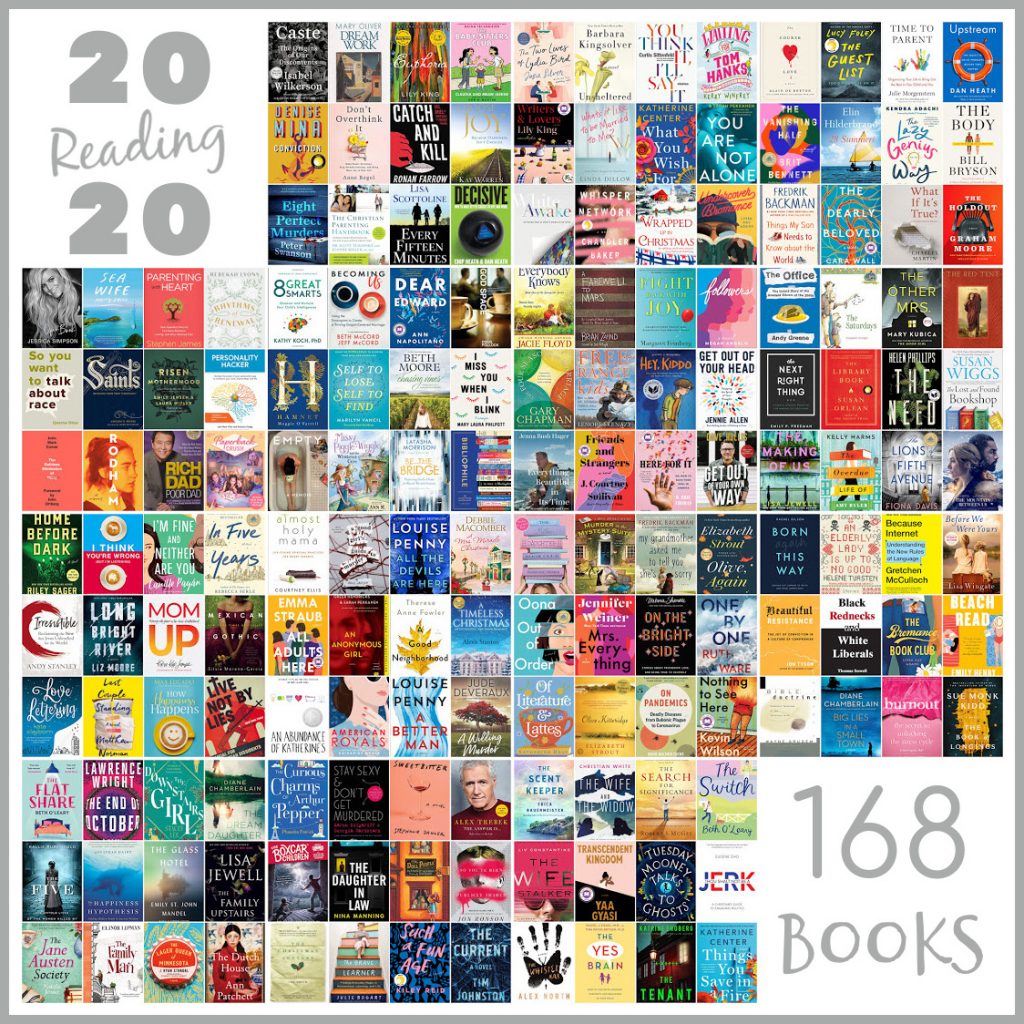
Before we get to my list of this year’s Best Reads, I hope you’ll first indulge me in some literary reflection. Methodical book-tracking and reading analysis might not be for everyone, but it happens to be a personal highlight of my own reading life. I’ve fine-tuned my record keeping, and currently document my book statistics in my bullet journal and in Day One, on Goodreads and Pinterest, in Evernote, and—of course—here on the blog. I enjoy spotting trends in my reading, and the documentation holds me accountable to maintaining some balance in my reading diet.
For blogging purposes, I track my books from December-November, meaning that my “2020 Reads” are actually the books I finished between December 1, 2019, and November 30, 2020. I don’t strive to read a particular number of books each year, and I was surprised that in this strange year of quarantine, twin babies/toddlers, and homeschooling—not to mention increased podcast listening and news consumption—I managed to polish off 168 books (not counting the dozen or so chapter books I read with Charleston, or the Bible, which I read from Genesis-Revelation again this year). That put me just two books shy of my 2019 total of 170, but much lower than my record of 205 books in 2018. According to Goodreads, this year’s books added up to 51,340 pages meaning that my average book length was around 305 pages.
Overall, I had good success with choosing enjoyable reads this year, with thirty 4.5- or 5-star books, and only twelve books that I rated less than three stars. I also DNF’d a handful of titles that never made it into my book logs. (While I remain a proponent of book abandonment in principle, I still have a hard time practicing what I preach in that department.) The chart below shows my star-breakdown for this year’s books. (If you’re curious, as I know I would be, this is the single 1.5-star book represented in that chart.)
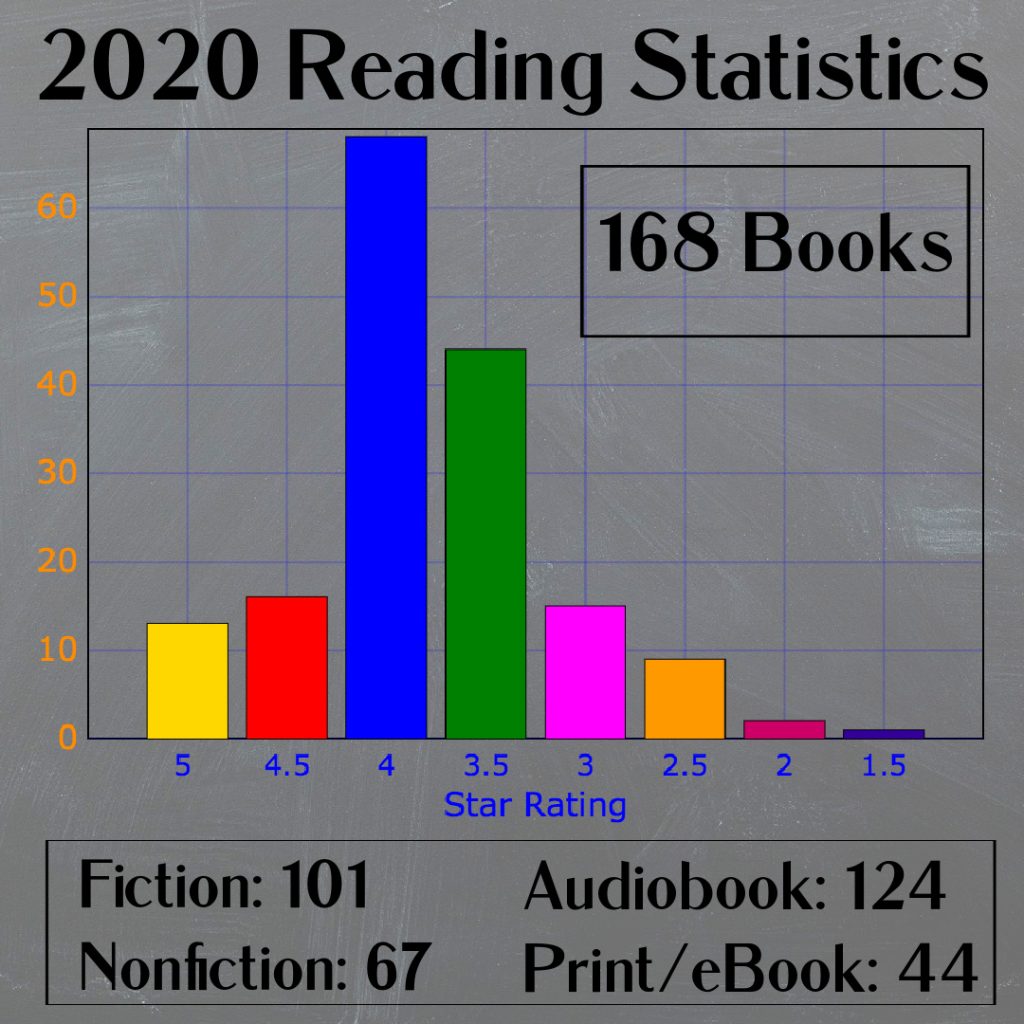
As with past years, a significant portion of my reading this year was done via audiobook. In fact, despite an ongoing goal to decrease the percentage of my books that are read via audio, that percentage has gone up in the fifteen months since the twins were born, as I no longer get my daily hour of Kindle time in at the gym where, up until last year, I did most of my reading.
I appreciate the convenience of audiobooks, which I can “read” on the road, on walks, or while doing household chores. However, I much prefer to read with my eyes via eBook or—even better, though much less convenient and thereby less frequent—in physical book format. There are many reasons for this preference, most notably that I am better able to retain the non-audiobooks, and therefore tend to enjoy them much more. Tellingly, 68% (fifteen) of my favorite books this year were either print or Kindle reads, whereas print/eBooks made up only 26% of my total books for the year. (This number is slightly misleading, as I do tend to “save” the most promising books for physical reading, which predisposes me to like these books more.)
I consumed more fiction than nonfiction this year, often choosing fiction for audio and reserving nonfiction titles for print/Kindle since I like being able to highlight my nonfiction books.
As for Book Goals in 2021, I haven’t formed any just yet, beyond my longstanding goal to read more with my eyes and less with my ears. I’m contemplating doing a genre-related book challenge next year, and if I choose to do one, you all will be the first to know about it!
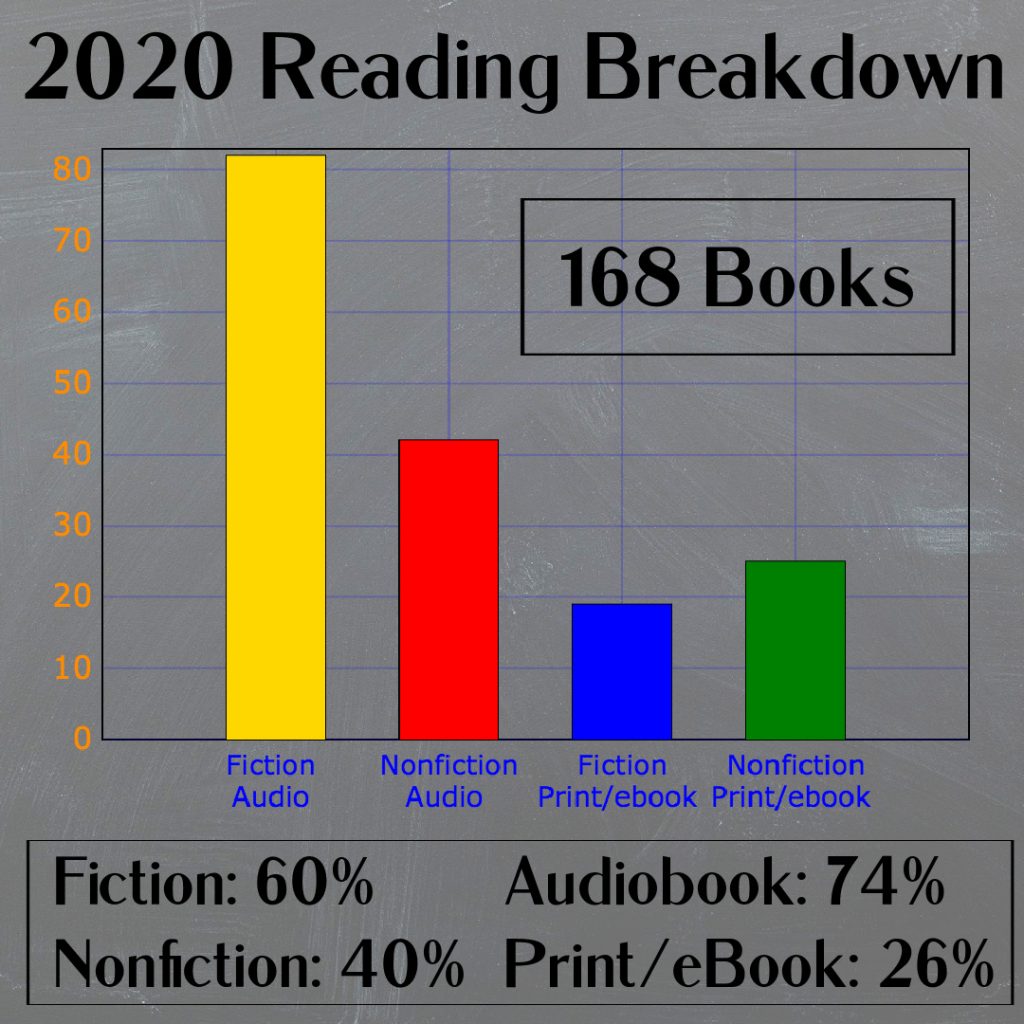
Okay. . . now that we’ve gotten the nitty-gritty analysis out of the way, let’s hone in on the good part: my favorite books of 2020! This year’s compilation of Top Books includes just eight novels and a shockingly high FIFTEEN nonfiction titles, all of which happened to fall into fairly tidy categories. (I can’t begin to express how happy it makes me when coincidence complies with my OCD!)
I chose to exclude rereads and sequels from this list. I also prioritized books that truly stuck with me, thereby eliminating a few books that I rated highly when I read them but that didn’t leave a strong impression as I look back over the course of twelve months of reading. The books on this list were ones that I read in 2020, but not all of them were published this year.
Alright folks, without any further ado, here are my most recommendation-worthy books of 2020! Next to each title, I’ve linked to the Quick Lit or Book Review post containing my full review. Please feel free to ask questions about specific books, or to request further recommendations!
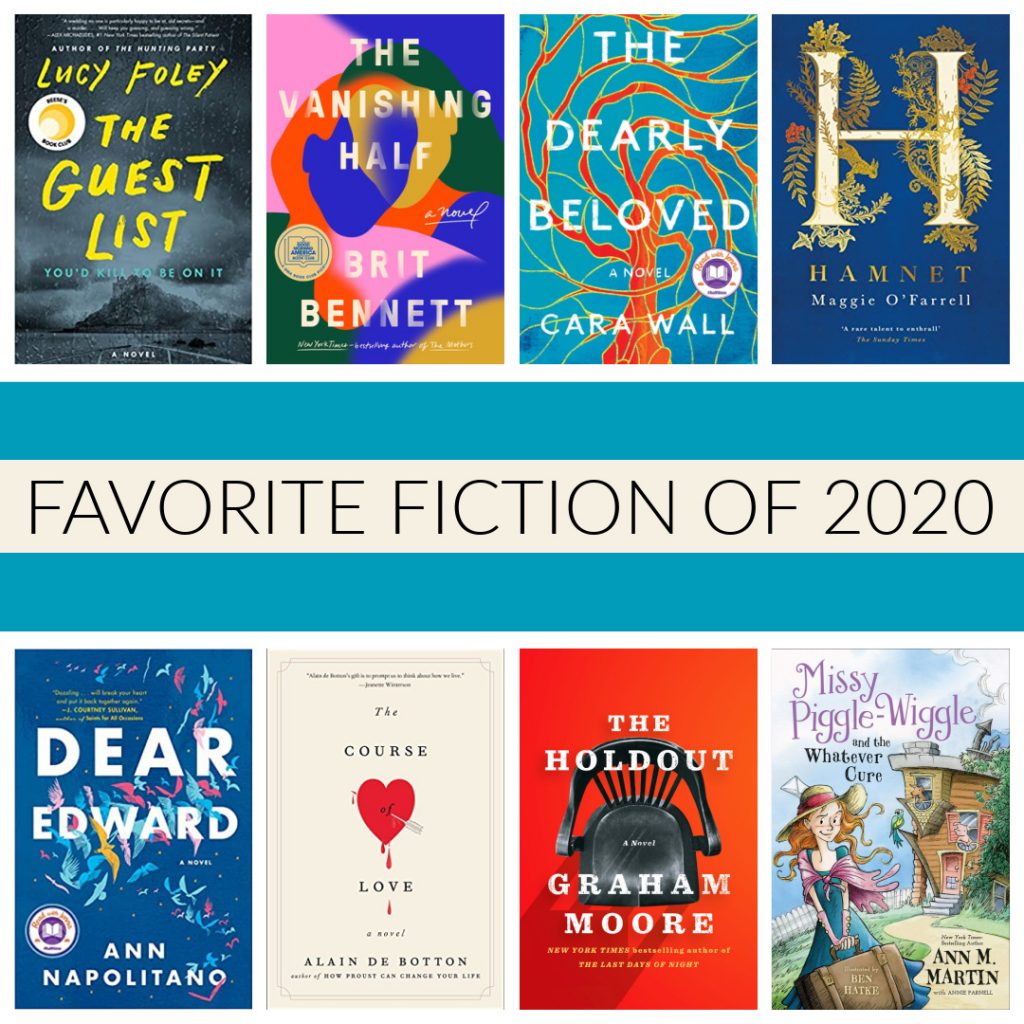
FAVORITE NOVEL OF 2020: The Dearly Beloved, by Cara Wall (Reviewed Here)
This was one of the first books I read this year, and no other novel came close to becoming my #1 favorite book of 2020. Set in the 1960s, it is the story of two pastoring couples and their journeys from adolescence and courtship to marriage and life in church ministry. Walls utilizes the unique experiences of the four protagonists to examine the nature of faith—how it is gained and lost, what it is and isn’t, why it is necessary, and how it serves us. The book is also an exploration of love, sacrifice, friendship, partnership, and the ways that other life forces play into these dynamics. The remarkable characters, nuanced storylines, and compellingly layered themes made this a standout read I can’t stop recommending.
FAVORITE HISTORICAL FICTION: Hamnet, by Maggie O-Farrell (Reviewed Here)
Inspired by the life and death of William Shakespeare’s young son, this exquisite novel is perhaps the saddest book I have ever read: rarely have I felt so invested in the fate of a family, or experienced their pain and longing so viscerally. Hamnet is a beautifully poignant exploration of grief, motherhood, and sacrifice.
FAVORITE COMING-OF-AGE: Dear Edward, by Ann Napolitano (Reviewed Here)
When a plane crash takes the lives of his parents and brother, twelve-year-old Edward is left alone to navigate his own personal heartache in the midst of his newfound celebrity status as the crash’s only survivor. This is another tragic yet insightful novel featuring complex characters and resonant emotions.
FAVORITE LOVE STORY: The Course of Love, by Alain De Botton (Reviewed Here)
In The Course of Love, we follow one ordinary couple past the early “happily ever after” stages of their relationship to explore something much deeper. Interwoven throughout their love story are philosophical and psychological commentaries that lift us out of the narrative and bring insight and application to the nuances of their marriage. The result is novel that reads like a mashup between a fable and a sociology textbook. This is not your typical romance book—it’s MUCH better! (Head’s up, though, for a few seriously steamy scenes.)
FAVORITE MYSTERY: The Guest List, by Lucy Foley (Reviewed Here)
On an island off the coast of Ireland, guests gather for a high-profile wedding in which old resentments resurface, past secrets are exposed, guests resort to poor behavior, and a murder takes place. This locked door mystery is about as close to an Agatha Christie read-alike as they come—a sinfully delicious read!
FAVORITE LEGAL THRILLER: The Holdout, by Graham Moore (Reviewed Here)
This twisty legal thriller is masterfully crafted, with compelling parallel story lines featuring a defense attorney who is reunited with her fellow jurors from a decade-old murder trial that changed the trajectory of many people’s lives. The book delves into intriguing themes of race, justice, and moral conviction, and it offers a unique behind-the-scenes look at the world of criminal law.
FAVORITE KID LIT: Missy Piggle-Wiggle, by Ann M. Martin (Reviewed Here)
Charleston and I both loved this modern take on the classic Mrs. Piggle-Wiggle series. The stories retain the original series’ humor and quaint neighborhood setting while offering morality lessons in fun and subtle ways. Great for reading aloud, as this is one that will be equally enjoyed by kids AND their parents.
MOST THOUGHT-PROVOKING: The Vanishing Half, by Brit Bennett (Reviewed Here)
I hesitated to include this historical book on my list of 2020 favorites because I took issue with one of the novel’s core themes. Ultimately, I chose to include it in this list of favorites for its stellar writing and memorability. Through a story that spans four decades, we follow the trajectories of identical twin sisters—one of whom cannot deny that she is black, the other who has begun to believe her own lie that she is white. It is a poignant and timely novel that grapples with heavy themes, going beyond the more obvious subject of race to explore family dynamics, identity, motivations, societal and personal expectations, and cultural norms.
FICTION RUNNERS UP: Transcendent Kingdom (Literary Fiction) , Writers and Lovers (Literary Fiction, Romance), A Good Girl’s Guide to Murder (YA, Mystery), Long Bright River (Literary Thriller)
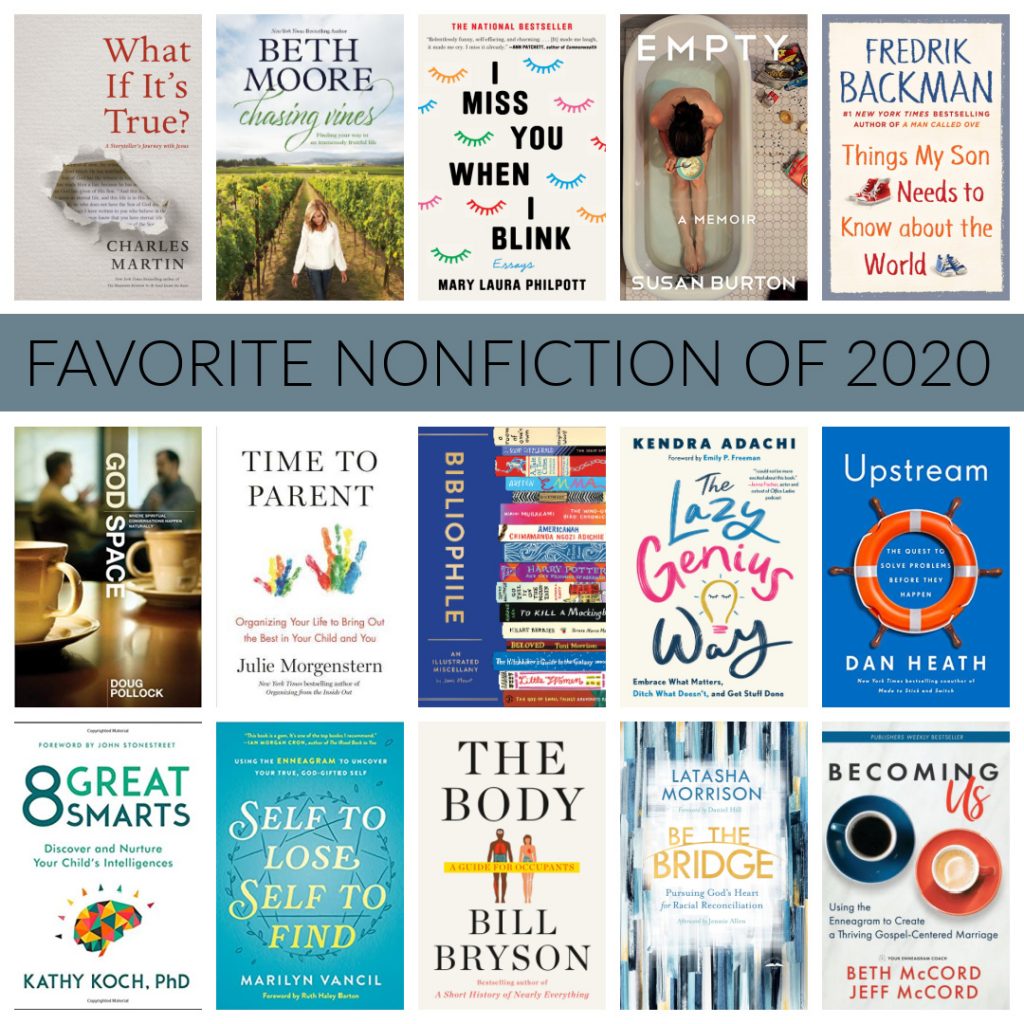
FAVORITE MEMOIR: Empty, by Susan Burton (Reviewed Here)
This is a courageous and gut-wrenchingly transparent look into the author’s lifelong battle with anorexia and overeating. Burton bravely shares the intricacies of her complex and deeply tormented relationship with food, and I found her exploration of body image, addiction, secrecy, and shame relatable, heartbreaking, and inspiring.
FAVORITE ESSAY COLLECTION: I Miss You When I Blink, by Mary Laura Philpott (Reviewed Here)
I resonated SO MUCH with these humorous and self-aware reflections about motherhood, identity, perfectionism, career life, marriage, fulfillment, and the uneasy intersection of these realms. Standout essays from the collection offer insight into the passage of time, the transition to motherhood, learning to pivot, and coping with superficiality—all subjects I never tire of thinking and reading about.
MOST HUMOROUS: Things My Son Needs to Know About the World, by Fredrik Backman (Reviewed Here)
Through stream of consciousness essays and laugh-out-loud stories, Backman writes candidly about his various parenting experiences with sleep deprivation, poop mishaps, daycare awkwardness, and frustrations with excessive baby gear. He also gets philosophical, sharing wisdom and advice on everything from gender equality and friendship to faith, trauma, survival, and learning to fit in. Backman is one of my favorite novelists, and this essay collection is even better than his works of fiction.
FAVORITE SELF IMPROVEMENT: The Lazy Genius Way: Embrace What Matters, Ditch What Doesn’t, and Get Stuff Done, by Kendra Adachi (Reviewed Here)
Life hacks and habit-formation strategies are fairly easy to come by; thankfully, The Lazy Genius Way offers much more than dry expert advice. Kendra Adachi is one of my most trusted Life Gurus, and her book is an invaluable resource, providing a template for determining what needs to be done and how to do it. These strategies are actionable and effective, and Kendra’s humorous writing, touching vulnerability, and relatable stories make this book an entertaining and memorable read.
BEST OF CHRISTIAN LIVING: Chasing Vines: Finding Your Way to an Immensely Fruitful Life, by Beth Moore (Reviewed Here)
Building upon the metaphor of the vineyard that is seen throughout Scripture, Beth Moore unpacks the abundantly fruitful life in store for those who abide in Christ when we subject ourselves to the rocky soil in which we have been planted and open our hearts to painful but necessary pruning by our divine Vinedresser. Moore impressed me with the caliber of her writing and the depth of her content. This is a rare book that will be appreciated by seasoned Christians and new believers alike.
FAVORITE BOOK ON THEOLOGY: What If It’s True: A Storyteller’s Journey With Jesus, by Charles Martin (Reviewed Here)
From the acclaimed Christian romance novelist Charles Martin, this book is part Christian Living, part memoir, part historical fiction, and 100% Bible study/application. I was blown away by the scope of Martin’s Biblical knowledge, his fervent passion for the Lord, and his vulnerability in sharing the ways he is being transformed by God’s Word as he brings Scripture to life through an evocative reimagining of the conversations, details, and emotions involved in familiar Bible stories.
FAVORITE BOOK ON EVANGELISM: God Space: Where Spiritual Conversations Happen Naturally, by Doug Pollock (Reviewed Here)
This is the most practical and helpful book I’ve read on presenting the Gospel to nonbelievers. And while the book is geared toward sharing one’s faith, the principles can be applied in various other contexts: we could all benefit from becoming better listeners and observers, and these steps pave the way for deeper connection, friendship, and trust as we dig into conversations about things that are important to us.
BEST BOOK ABOUT BOOKS: Bibliophile: An Illustrated Miscellany, by Jane Mount (Reviewed Here)
In this brilliantly illustrated tribute to all things literary, Jane Mount brings creativity, whimsy, and plenty of trivia to an examination of books, writers, readers, and bookish haunts. This would make a perfect gift book for your favorite book lover!
FAVORITE BOOK ON RACE/SOCIAL JUSTICE: Be the Bridge: Pursuing God’s Heart for Racial Reconciliation, by Latasha Morrison (Reviewed Here)
Of the many anti-racism books I read this year, Be the Bridge was an easy favorite. The book is solution-driven, focusing on how we can achieve true healing and reconciliation by applying Biblical principles such as lamentation, confession, and forgiveness. Tasha is an admirable leader in this work, modeling empathy, humility and a genuine heart for peaceful change. While this book does not shy away from the atrocities wrecked by racism, it guides readers beyond our shameful past and into a hopeful future.
BEST OF EDUCATIONAL PSYCHOLOGY: 8 Great Smarts: Discover and Nurture Your Child’s Intelligences, by Kathy Koch (Reviewed Here)
Dr. Kathy Koch explains why and how recognizing your child’s intelligence is important for his or her academic, intellectual, spiritual, and social growth. Koch explores eight types of intelligence, showing parents and educators how to awaken a child’s specific smart, and illustrating how children can use their smarts in constructive ways. An invaluable resource for every parent and teacher, or for anyone who would like to get in touch with their own unique brand of intelligence.
FAVORITE BOOK ON PARENTING: Time to Parent, by Julie Morgenstern (Reviewed Here)
Organization expert Julie Morgenstern provides parents with a much-needed blueprint for parenthood, which includes four aspects of RAISING a human being (providing, arranging, relating, and teaching) and four aspects of BEING a human being (sleep, exercise, love, and fun). With its unique blend of organizational tips and parenting advice, this book is unlike any other parenting book I’ve read and I found it incredibly helpful.
FAVORITE ENNEAGRAM BOOK: Self to Lose, Self to Find: Using the Enneagram to Uncover Your True, God-Gifted Self, by Marilyn Vance (Reviewed Here)
This unique approach to the Enneagram presents the framework as a vehicle for authentic life change as we acknowledge our unhelpful coping mechanisms and exchange them for genuine freedom. Self to Lose adds to the Enneagram cannon in distinctive and helpful ways while also serving as a comprehensive guide for Enneagram newbies.
BEST RELATIONSHIP BOOK: Becoming Us: Using the Enneagram to Create a Thriving Gospel-Centered Marriage, by Beth and Jeff McCord (Reviewed Here)
It’s probably not a surprise that I couldn’t limit my favorite Enneagram books of the year to just one title, but this one is a little different from Self to Lose in that its focus is the application of the Enneagram as a catalyst for improved communication and understanding between spouses. The book provided some huge aha! moments for my own dynamic with my Type 5 husband, and Luke found it helpful in understanding some of my Type 1 tendencies. We LOVED the focus on the Gospel and the repeated emphasis that growth in ourselves and our relationships cannot occur without Christ working in us.
BEST SCIENCE BOOK: The Body, by Bill Bryson (Reviewed Here)
This fascinating book turns the seemingly dry subject of anatomy into a scintillating exposé of the body and its various parts and functions. A must-read for anyone who enjoys reading counterintuitive facts, or appreciates the intersection of history and science.
MOST MEMORABLE: Upstream: The Quest to Solve Problems Before They Happen, by Dan Heath (Reviewed Here)
Upstream provides an entirely new way of solving problems long before they happen. Heath probes the psychological problems that push us into downstream (reactive) thinking and reveals how to overcome obstacles by switching to an upstream (big-picture/proactive) mindset. This book—more than anything else I read or heard this year—has transformed my approach to thinking about problems and solutions at both the macro and micro levels.
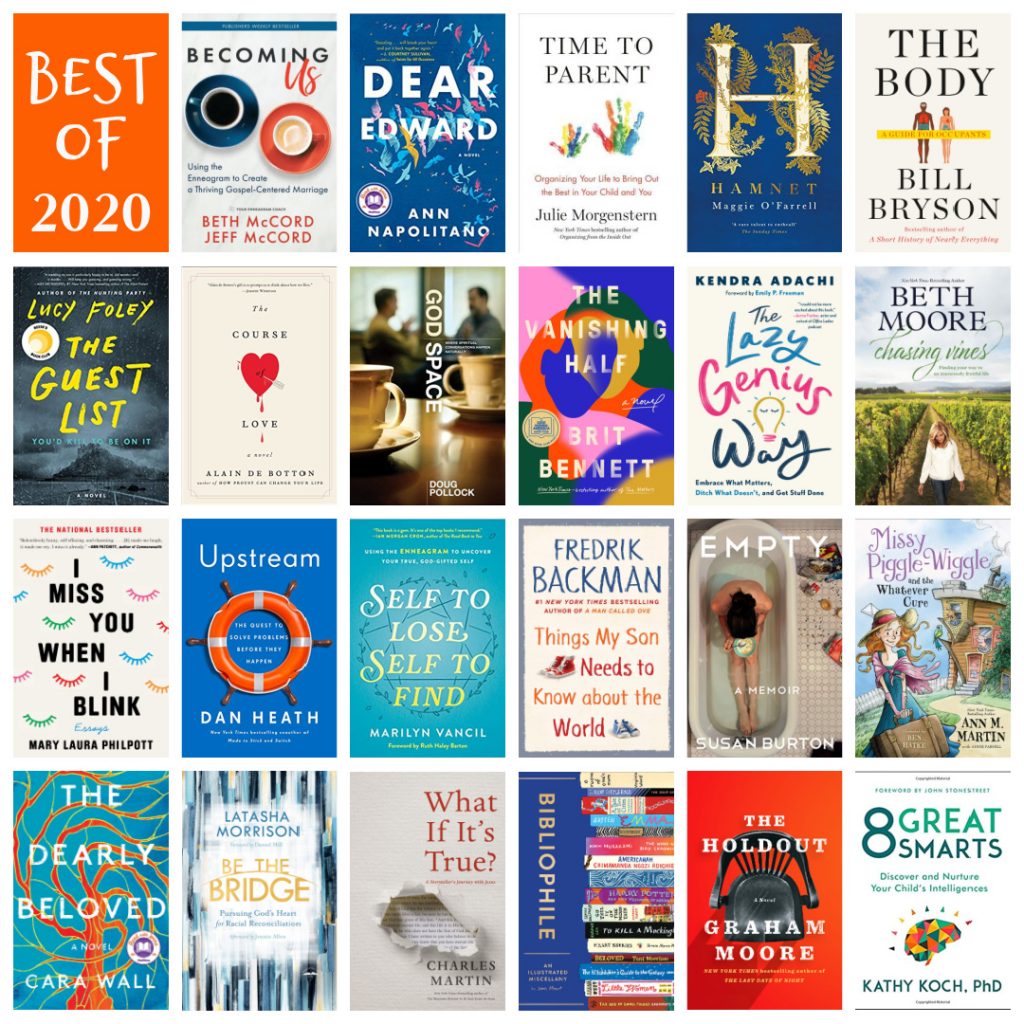
That’s a wrap for this year’s reading! I would love to here from you about YOUR Reading Life in 2020. Were you happy with the quantity and quality of the books you read this year? What were your favorites? I’d also love to know if you have set any reading goals for 2021 and if you have any recommendations for books I MUST read or book challenges I need to tackle in the coming year.
Ahh I love that you track your books from December – November because it makes for such an easy way to wrap-it up in December before the next year begins! and categories galore 🙂
I also have noticed an increase in my audiobook listening this year but not as significant as yours…
Here’s what my family and I have been reading over the past month because I just can’t quite tackle the full year’s book list yet 🙂
https://www.everyoneslibrarian.com/blog/quick-lit-december-2020
I love reading stats, though mine are less complex than yours – number of books (noting audio, e- and physical book) and page total. I deliberately slowed down my reading at the end of the year, as I felt I was beginning to race through books too much, so I’m happy not to match last year’s total. This month’s review is at https://susandcook.blogspot.com/2020/12/quick-lit-december-2020.html if you are interested. Hope 2021 is a great reading year for you!
The compulsion to race through books is SUCH a struggle for me! I want to slow down but seeing a lower book count is not great for my ego. 😩
Ahhhhh! What a great year! I loved LOVED dearly Beloved (but i read it last year!). I need to wrangle my list this week! I love your nerdy stats! I’ll be doing the same!
I’m looking forward to reading your list!